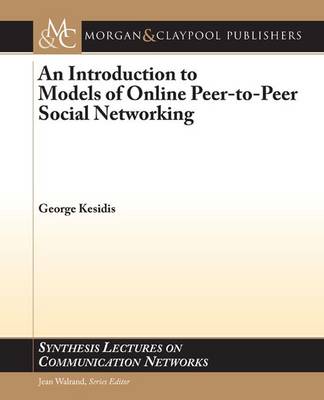Synthesis Lectures on Communication Networks
1 total work
An Introduction to Models of Online Peer-to-Peer Social Networking
by George Kesidis
Published 5 May 2010
This book concerns peer-to-peer applications and mechanisms operating on the Internet, particularly those that are not fully automated and involve significant human interaction. So, the realm of interest is the intersection of distributed systems and online social networking. Generally, simple models are described to clarify the ideas. Beginning with short overviews of caching, graph theory and game theory, we cover the basic ideas of structured and unstructured search. We then describe a simple framework for reputations and for iterated referrals and consensus. This framework is applied to a problem of sybil identity management. The fundamental result for iterated Byzantine consensus for a relatively important issue is also given. Finally, a straight-forward epidemic model is used to describe the propagation of malware on-line and for BitTorrent-style file-sharing.
This short book can be used as a preliminary orientation to this subject matter. References are given for the interested student to papers with good survey and tutorial content and to those with more advanced treatments of specific topics. For an instructor, this book is suitable for a one-semester seminar course. Alternatively, it could be the framework for a semester's worth of lectures where the instructor would supplement each chapter with additional lectures on related or more advanced subject matter. A basic background is required in the areas of computer networking, probability theory, stochastic processes, and queueing.
This short book can be used as a preliminary orientation to this subject matter. References are given for the interested student to papers with good survey and tutorial content and to those with more advanced treatments of specific topics. For an instructor, this book is suitable for a one-semester seminar course. Alternatively, it could be the framework for a semester's worth of lectures where the instructor would supplement each chapter with additional lectures on related or more advanced subject matter. A basic background is required in the areas of computer networking, probability theory, stochastic processes, and queueing.
